Finding Value in the Used Funeral Equipment Market
If you're searching for used funeral home equipment for sale, here's what you need to know:
- Best Places to Buy: Morticians Marketplace (Facebook), NFDA Biz Exchange, eBay specialized storefronts
- Typical Savings: 25-40% off new retail prices
- Popular Items: Embalming tables ($5,000-$6,500 used vs. $6,500-$6,995 new), cremains processors ($5,500 used vs. $9,500 new)
- Key Inspection Points: Stainless steel quality, hydraulic integrity, load capacity ratings
The second-hand funeral equipment market represents a significant opportunity for funeral directors looking to maximize their operational budget without compromising on quality. Many professionals don't realize that gently used mortuary equipment often performs identically to new items at a fraction of the cost. With proper inspection and verification, purchasing pre-owned equipment can be a smart business decision that frees up capital for other important aspects of your funeral service.
I'm Mortuary Cooler, a national-level supplier of mortuary refrigeration units who has helped hundreds of funeral directors steer the used funeral home equipment for sale marketplace to find reliable, cost-effective solutions. My experience has shown that with the right knowledge, funeral professionals can confidently purchase second-hand equipment that meets all their operational needs while saving thousands of dollars.
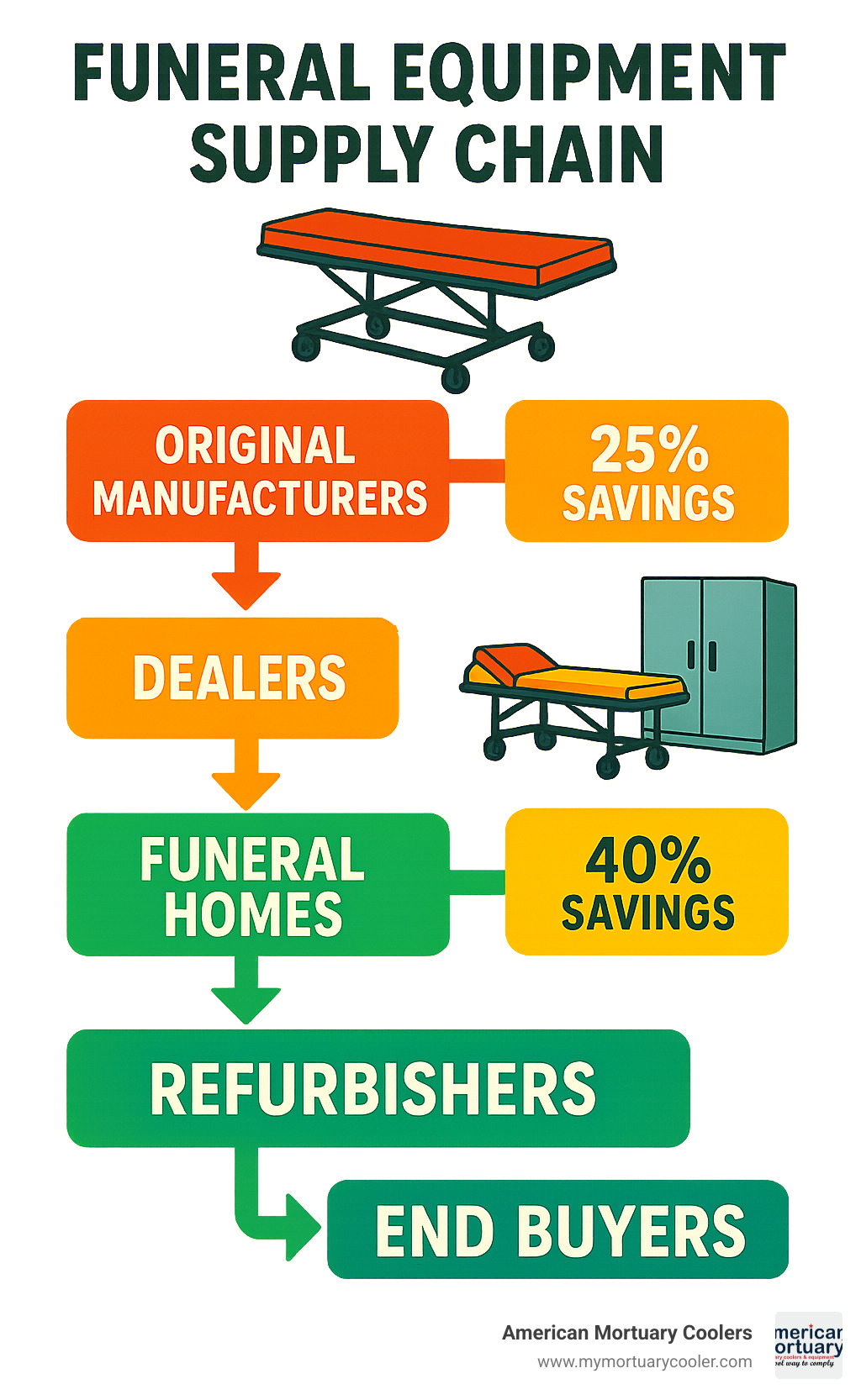
Simple guide to used funeral home equipment for sale: - seat stretcher - stainless steel rolling cabinet
Why the Second-Hand Market Makes Sense for Funeral Homes
Running a funeral home isn't cheap, and every dollar counts when you're providing compassionate service while trying to maintain a healthy business. That's why at American Mortuary Coolers, we've watched with interest as more and more funeral directors turn to the second-hand market to make their budgets work harder.
The truth is, funeral equipment is built to last. A well-made stainless steel embalming table isn't going to wear out anytime soon—many serve faithfully for decades with just basic care. This creates a perfect opportunity in the secondary market where you can find equipment with plenty of life left when other funeral homes upgrade or close their doors.
When it comes to depreciation, mortuary equipment follows a predictable pattern. That shiny new preparation table might lose 20-30% of its value in the first year, but after that, the depreciation curve flattens considerably. This means equipment that's just a few years old often works perfectly while costing substantially less than buying new.
We've seen all types of funeral professionals benefit from the used funeral home equipment for sale marketplace:
If you're opening a new funeral home, you can slash your startup costs by 30-40% by choosing quality used equipment. For established funeral homes, the second-hand market lets you upgrade more frequently by selling your current gear and reinvesting. Smaller rural operations with tighter budgets can access professional-grade equipment they might otherwise have to postpone purchasing. Even mortuary science schools find the used market perfect for acquiring training equipment at prices that work with educational budgets.
There's an environmental angle too. By purchasing pre-owned equipment, you're extending the useful life of well-built products and keeping perfectly good items out of landfills. We've noticed demand for used equipment has actually increased since 2020, partly due to supply chain issues affecting new equipment availability and driving up prices.
Don't forget about the tax benefits either. While new purchases offer depreciation advantages over time, used equipment often provides better immediate expense deductions relative to what you paid—something your accountant will appreciate come tax season.
How Much Can You Really Save?
The numbers don't lie when it comes to the value of used funeral home equipment for sale. After working with funeral homes across the country, we've gathered some real-world figures on typical savings:
| Equipment Type | New Price Range | Used Price Range | Typical Savings |
|---|---|---|---|
| Hydraulic Embalming Tables | $6,500-$6,995 | $5,000-$6,500 | 15-25% |
| Cremains Processors | $9,500 | $5,500 | 42% |
| Mortuary Cots/Stretchers | $3,500-$4,900 | $1,695-$2,889 | 40-50% |
| Casket Lifts | $4,000-$6,000 | $2,800-$4,200 | 30-35% |
| Crematory Retorts | $80,000-$150,000 | $50,000-$95,000 | 35-40% |
| Mortuary Refrigeration Units | $8,000-$15,000 | $4,500-$9,000 | 35-45% |
Of course, individual deals vary based on condition, age, and your location, but these figures represent what we typically see in the market. The biggest savings tend to come on the big-ticket items—a used crematory retort or walk-in refrigeration system could save you tens of thousands of dollars while still providing years of reliable service.
Just last year, we helped several funeral homes in the Southeast find gently used walk-in refrigeration units at savings of up to 45% off new prices. Those units are still running beautifully today, and the funeral directors who purchased them were able to allocate those savings to other aspects of their business.
When you're working with tight margins, finding ways to stretch your equipment budget without compromising quality isn't just smart—it's essential for long-term success.
Where to Find Used Funeral Home Equipment for Sale
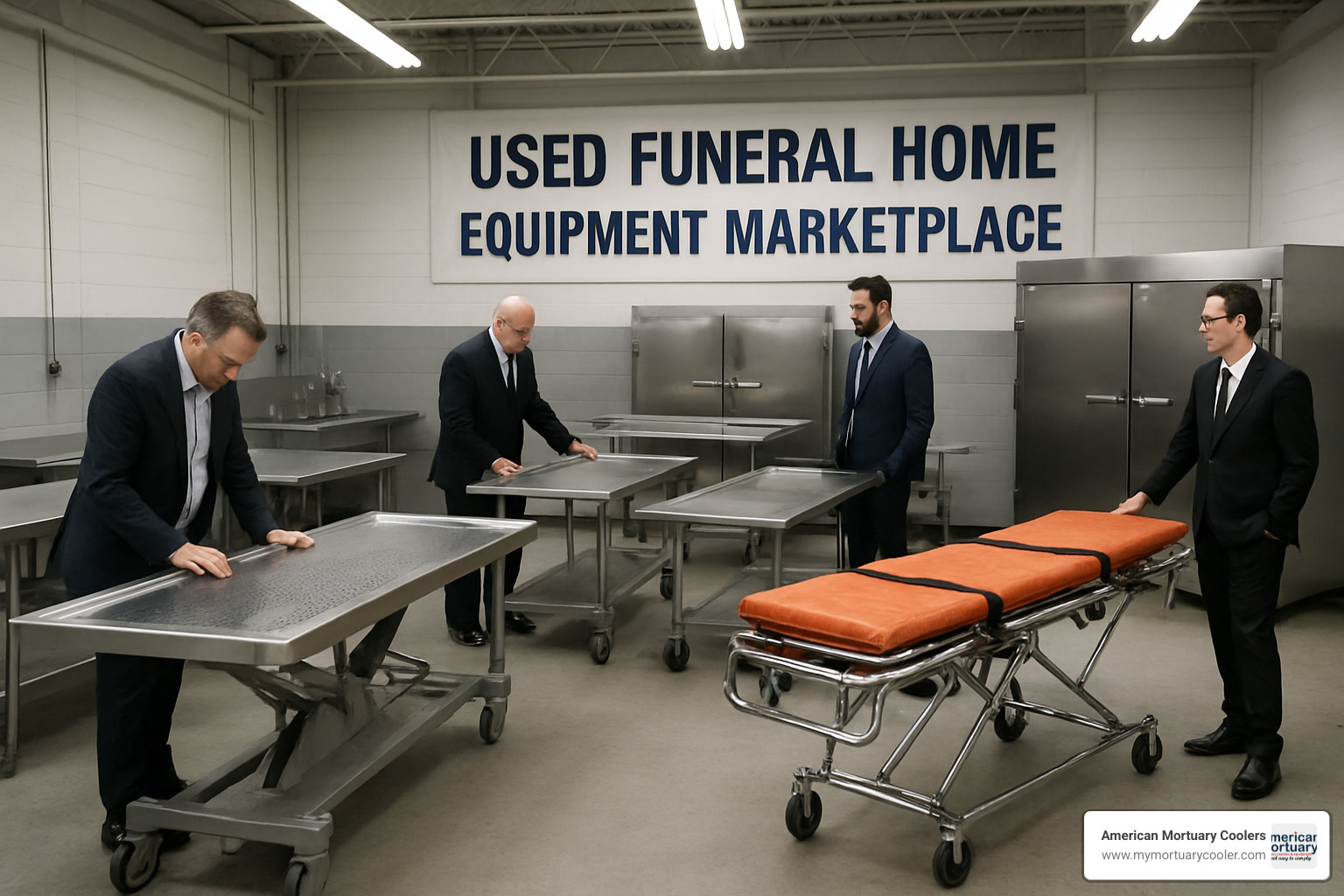
Finding quality used funeral home equipment for sale is a bit like treasure hunting - you need to know the right places to look. After helping hundreds of funeral directors find great deals, I've learned that the best opportunities rarely appear on mainstream marketplaces.
Top Online Marketplaces for Used Funeral Home Equipment for Sale
The digital world has transformed how funeral professionals connect and trade equipment. Morticians Marketplace on Facebook has become the virtual water cooler of our industry - a private group where thousands of funeral professionals post everything from embalming tables to small tools. What makes it special is the community aspect - you can ask direct questions about that used preparation table and get honest answers from peers who speak your language.
The NFDA Biz Exchange offers another trusted option. Since listings come from verified National Funeral Directors Association members, there's an added layer of confidence in these transactions. We've connected many of our Tennessee clients with quality equipment through these listings.
Many funeral directors don't realize that eBay has specialized storefronts dedicated to mortuary equipment. The Embalming Machines on eBay shop is just one example. The platform's buyer protection makes this a safer bet when purchasing from across the country.
For larger items like crematory retorts or hydraulic lifts, Machinio often has listings that fly under the radar. And don't overlook funeral supply companies themselves - many maintain "used inventory" pages on their websites featuring trade-ins or refurbished equipment with partial warranties.
Here's a pro tip we share with our clients: when searching general sites like Craigslist, use industry terms like "mortuary" or "embalming" rather than generic words like "table." You'd be surprised how often valuable equipment gets listed by liquidators who don't know the specialized terminology.
Brick-and-Mortar Dealers & Liquidators
Despite our digital world, physical locations remain goldmines for used equipment. Retirement sales happen when funeral directors close shop without passing the business to family members. We recently helped a client furnish almost their entire preparation room from such a sale at about 40% of new costs.
Hospital surplus sales are another overlooked opportunity. Hospital morgues regularly update their equipment, and their surplus often includes high-quality stainless steel tables and transport equipment at significant discounts.
When crematories close or upgrade their retorts, substantial equipment becomes available through specialized brokers. Similarly, estate auctions of funeral home properties sometimes auction equipment separately, and local auction houses may not adequately advertise these specialized items - creating perfect opportunities for knowledgeable buyers.
At American Mortuary Coolers, we've built relationships with equipment dealers across the Southeast Region, including Georgia and Tennessee, which helps us connect our customers with the best available used options when they're not looking for our custom solutions.
Networking & Industry Groups
The funeral profession remains relationship-driven, and sometimes the best equipment never makes it to public listings. State Funeral Director Associations often maintain member-only email lists where equipment gets posted before hitting the open market.
Trade shows offer the irreplaceable advantage of seeing and touching equipment before purchase. We attend shows across the country, from New York to Dallas to Chicago, and always notice funeral directors exchanging information about available equipment during continuing education seminars.
Don't overlook industry publications either - those trade magazines and newsletters sitting in your office often contain classified sections with equipment listings that never appear online.
The used funeral equipment market rewards those who stay connected and know where to look. Whether you're expanding your operation or just starting out, finding quality pre-owned equipment can make a significant difference to your bottom line while still maintaining the professional standards your families deserve.
What to Inspect Before You Buy Pre-Owned Gear
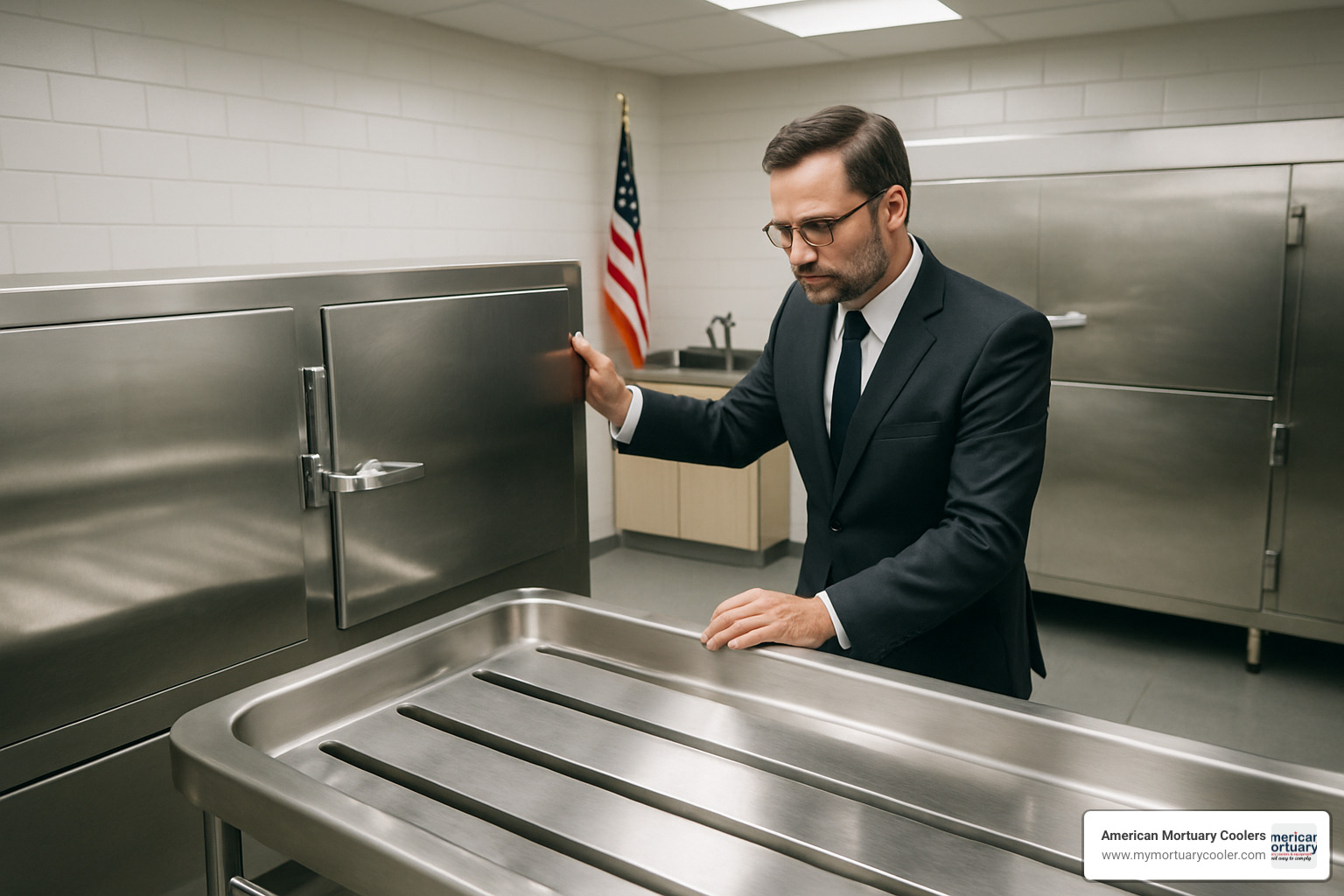
When you're in the market for used funeral home equipment for sale, a thorough inspection can make the difference between a bargain and a burden. Having helped hundreds of funeral directors find quality pre-owned equipment, I've learned what separates the good deals from the regrettable ones.
Brand Reputation and Construction
Trust matters in our industry. Names like Ferno, Matthews, and Pierce have earned their reputation for building equipment that lasts decades, not just years. When examining any stainless steel piece, run your hand along the surface and look for that Type 304 stainless steel stamp or documentation. This higher-grade material resists the harsh chemicals we use daily and won't corrode like lesser grades might.
I recently helped a funeral director in Georgia who saved nearly $2,000 on a premium brand embalming table that was only three years old but looked practically new. The previous owner had maintained it carefully, and that quality construction was evident in every weld and seam.
Mechanical and Hydraulic Systems
The moving parts tell the true story of any piece of equipment. When inspecting hydraulic systems on tables and lifts, watch for the subtle signs of wear that could spell trouble down the road.
A properly functioning hydraulic system should raise and lower smoothly without jerking or hesitation. Listen carefully—hydraulic systems should operate quietly, with minimal noise. Any unusual sounds could indicate air in the lines or pump issues.
Always check for those telltale hydraulic fluid stains on the floor beneath equipment or on the cylinders themselves. Even small leaks will eventually become big problems. And don't forget to test all locking mechanisms while actually loading the equipment—what works fine empty might fail under working conditions.
Load Capacity and Structural Integrity
With average body weights increasing, equipment capacity matters more than ever. Modern equipment typically handles between 500-1,000 pounds, but older used equipment might have lower ratings. Always verify the equipment can handle your needs.
Examine all welds closely—they're often the first failure points. Good welds should look like smooth, consistent beads without cracks or separation. For mobile equipment, test the casters on different floor surfaces. They should roll smoothly and lock securely, even on slightly uneven floors.
One of our Tennessee customers nearly purchased a used cot with a hairline crack in the frame support—something easily missed in photos but immediately apparent during an in-person inspection. That small crack could have led to a catastrophic failure at the worst possible moment.
Electrical Systems and Certifications
For equipment with electrical components, safety certification is non-negotiable. Look for UL, ETL, or CSA marks that indicate the equipment met safety standards when manufactured.
Test every electrical function through its complete cycle. Motors should run smoothly without overheating, even after several minutes of operation. Check all cords and plugs for any signs of damage, melting, or previous repairs.
I recommend bringing a simple outlet tester when inspecting used electrical equipment. You'd be surprised how many issues stem from improper grounding or wiring that can damage equipment over time.
Documentation and History
The paper trail reveals the true life story of any piece of equipment. Always request:
Original manuals and spec sheets are worth their weight in gold when you need to troubleshoot issues years later. Maintenance records show if the equipment received proper care or was neglected. Proof of purchase helps verify the actual age versus what the seller claims. And warranty information might reveal transferable coverage you didn't know existed.
At American Mortuary Coolers, when helping funeral homes find used refrigeration units, we insist on reviewing the compressor service history. A well-maintained cooling system might cost more initially but will save thousands in emergency repairs and lost business due to equipment failure.
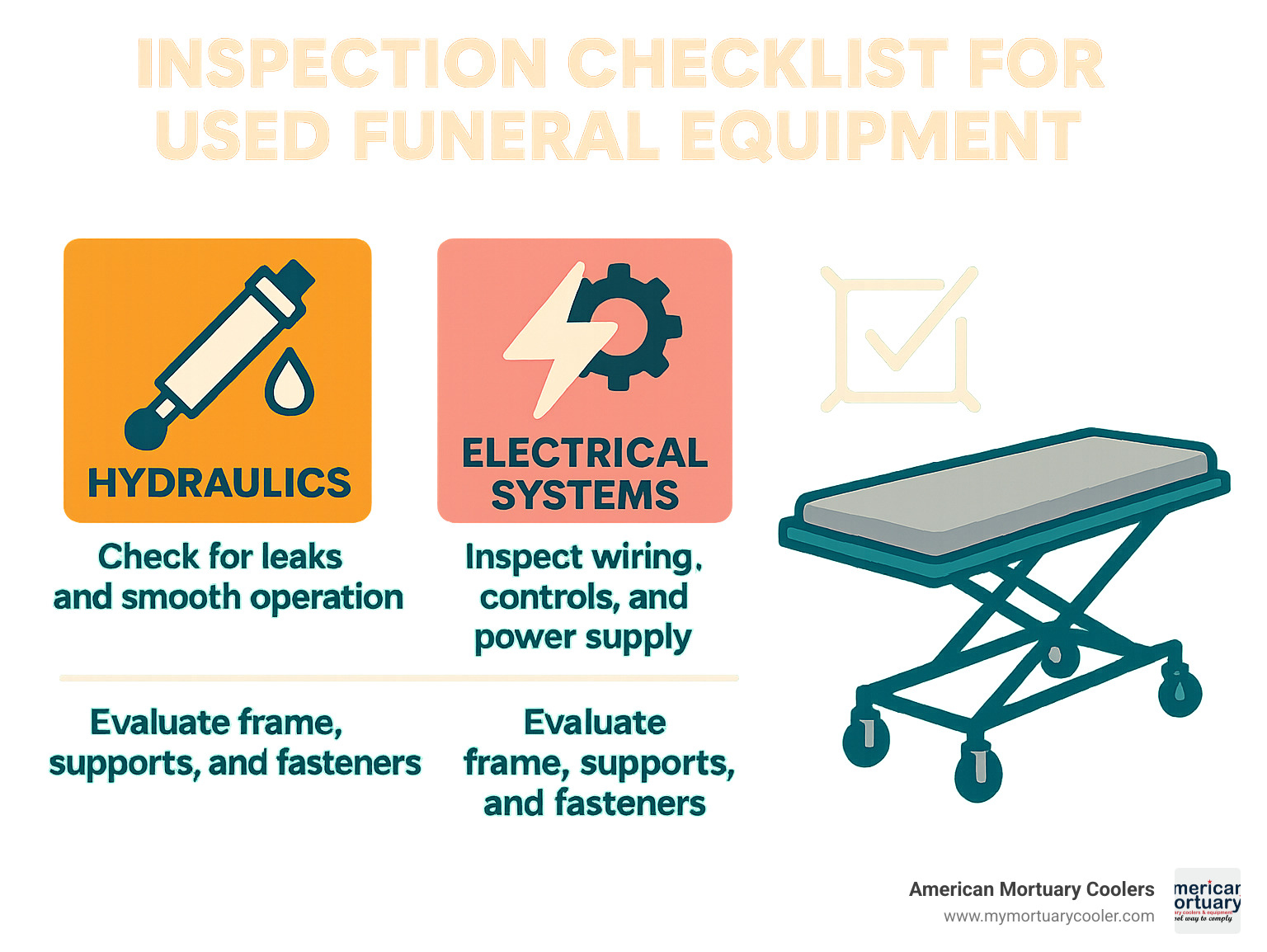
Red-Flag Checklist for Used Funeral Home Equipment for Sale
After inspecting hundreds of pieces of used equipment, I've developed a sixth sense for trouble signs. Watch out for these warning signals:
Rust and corrosion hide in corners and joints, so bring a flashlight and look in the hard-to-see places. Even small spots on stainless can indicate improper chemical use or storage in damp conditions.
Hydraulic issues almost never fix themselves. That slight hesitation in movement or tiny leak will only get worse with time. Test hydraulics multiple times—sometimes problems only appear after several cycles.
Missing components might seem minor until you realize replacements are no longer manufactured. I've seen funeral directors pay more for rare replacement parts than they did for the entire used piece of equipment.
Outdated electronics present a special challenge. Equipment from the early 2000s or earlier often contains control boards that are impossible to replace if they fail. Consider the availability of replacement parts before purchasing older electronic equipment.
Non-compliant features can force expensive retrofits or modifications. Equipment manufactured before current OSHA or EPA standards may require updates to meet regulations—sometimes at considerable expense.
Legal & Regulatory Considerations
The regulatory landscape for funeral service equipment continues to evolve, and used equipment isn't exempt from compliance requirements.
OSHA compliance affects workplace safety in significant ways. Preparation room equipment must meet standards for fluid exposure protection, proper ventilation, and ergonomic considerations. An inspection from your state board might happen at any time, and non-compliant equipment could result in citations.
State embalming room codes vary significantly across our service regions. What's perfectly acceptable in Tennessee might not meet California's stricter requirements. Always check your state's specific regulations before purchasing.
EPA disposal rules have tightened considerably in recent years. Older equipment might not have the containment features required for handling biological materials under current regulations.
Licensing transfers can be particularly important for specialized equipment like crematory retorts. Some jurisdictions require new certifications when ownership changes hands, potentially adding cost and delays to your purchase.
UCC filings are easy to overlook but critically important. Always verify that equipment isn't subject to liens or financial claims before purchasing. A simple UCC search in the seller's state can prevent major headaches later.
At American Mortuary Coolers, we've guided funeral homes from Los Angeles to Pittsburgh through the regulatory maze when purchasing used refrigeration equipment. We ensure all units we help source comply with current regulations for temperature control, refrigerant types, and energy efficiency standards. Our experience has shown that a thorough pre-purchase inspection saves far more than just money—it saves the reputation you've worked so hard to build.
For more detailed guidance on specific equipment types, check out our guide to Lift for Less: Your Guide to Buying Used Mortuary Lifts or learn about Buying Used Embalming Tables Without Getting Stiffed.
Selling Your Surplus: Best Practices & Safety Tips
Ready to turn your unused funeral equipment into cash? If you're on the selling side of the used funeral home equipment for sale marketplace, a few smart strategies can help you get top dollar while ensuring a smooth, safe transaction.
Documentation and Presentation
First impressions matter, even with used equipment. When I help funeral homes list their older mortuary coolers, I always emphasize the importance of good visuals. Take clear, well-lit photos from multiple angles that honestly show the condition. Close-ups of model numbers and control panels help buyers verify exactly what they're getting.
Beyond pictures, comprehensive documentation builds buyer confidence. Include detailed specification sheets with the manufacturer, model, age, dimensions, weight capacity, and power requirements. Being transparent about maintenance history and any repairs shows integrity that buyers appreciate.
I've seen sales happen twice as fast when sellers include a short video demonstration showing the equipment in operation. This simple step dramatically reduces buyer hesitation, especially for high-value items like hydraulic lifts or embalming tables.
Setting the Right Price & Financing Options
Pricing used funeral equipment is part science, part art. Most well-maintained equipment typically sells for 50-75% of its original retail price, depending on age and condition. The steepest depreciation happens in the first year (20-30%), then slows to about 5-10% annually before leveling off after 5-7 years.
When working with funeral homes across Tennessee and Georgia, I've found that offering flexible payment terms significantly expands your buyer pool. Consider lease-to-own arrangements or payment plans with reasonable deposits. Some sellers partner with third-party financing companies that specialize in funeral industry equipment.
If you're upgrading your equipment, don't overlook potential trade-in options. At American Mortuary Coolers, we sometimes work with funeral homes to help market their used refrigeration units when they upgrade to our custom solutions. This approach can offer tax advantages over separate sale transactions and simplifies the entire process.
Bundle discounts work wonderfully when selling multiple items. I've seen funeral homes successfully move less desirable pieces alongside high-demand equipment by packaging them together at an attractive overall price. This strategy clears out storage space and maximizes your return.
Shipping Large Funeral Gear Safely
The logistics of shipping funeral equipment can be daunting, but with proper planning, it's entirely manageable. Most large items ship via LTL (Less Than Truckload) freight carriers. I recommend obtaining quotes from multiple carriers and specifically asking about their experience handling sensitive equipment.
Proper packaging is absolutely worth the investment. For tables and larger items, custom-built crates provide the best protection. Always use heavy-duty pallets rated for your equipment's weight and include adequate padding to prevent movement during transit. For long journeys, moisture-resistant wrapping adds an extra layer of protection.
Most buyers will need lift-gate service for delivery. While this adds to the shipping cost, it ensures safe unloading and prevents potential damage or injuries. Always purchase adequate transit insurance—typically 110% of the sale value—for peace of mind.
For equipment that has been used with chemicals, you may need to provide certification of proper cleaning before shipping. Some carriers have specific HazMat requirements worth checking in advance.
Having coordinated equipment deliveries across all 48 contiguous states from our locations throughout the country, I've learned that clear communication about delivery expectations prevents most problems. Provide detailed assembly instructions if the equipment must be partially disassembled for shipping, and consider white-glove delivery services for high-value or particularly sensitive items.
With these approaches, you'll not only get the best price for your used funeral home equipment for sale, but you'll also build a reputation as a trustworthy seller in our close-knit industry.
Frequently Asked Questions about Used Funeral Home Equipment for Sale
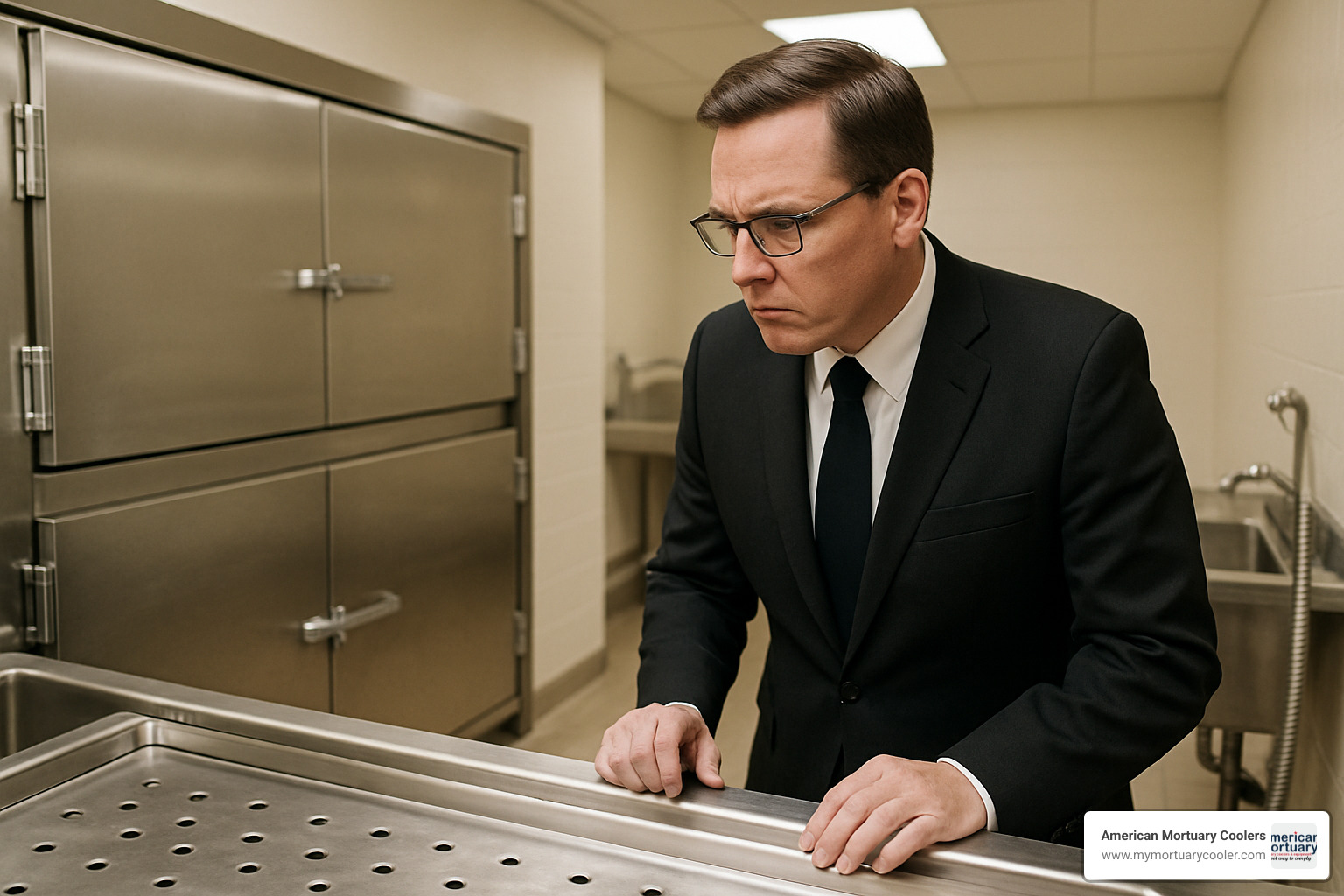
Who typically buys used funeral home equipment?
The market for used funeral home equipment for sale is surprisingly diverse:
-
Startup Funeral Homes - New businesses looking to minimize initial capital expenditure while still obtaining quality equipment.
-
Rural or Small-Town Funeral Homes - Operations with lower case volumes that need reliable equipment but can't justify the cost of new items for occasional use.
-
Mortuary Science Schools - Educational institutions seeking to provide hands-on training with actual industry equipment at educational budget prices.
-
Medical Schools and Anatomy Labs - These facilities often use mortuary equipment for educational and research purposes.
-
International Buyers - Funeral homes in developing countries frequently purchase used American equipment due to its quality and durability.
-
Restoration Specialists - Some companies purchase used equipment to refurbish and resell with warranties.
-
Collectors and Museums - Historical funeral equipment sometimes has value to collectors or museums preserving funeral traditions.
-
Film and Television Production Companies - Set designers occasionally seek authentic funeral equipment for production use.
Are warranties transferable on used mortuary equipment?
Warranty transferability varies significantly by manufacturer and equipment type:
- Original Manufacturer Warranties - Some manufacturers allow a one-time transfer of the remaining warranty period to a new owner, typically requiring:
- Documentation of the sale
- Inspection by an authorized service technician
-
Registration fee
-
Third-Party Warranties - Several companies offer aftermarket warranties for used funeral equipment, similar to extended warranties for used vehicles.
-
Seller Guarantees - Some reputable dealers of used equipment offer their own limited warranties, typically 30-90 days for mechanical components.
-
Service Contracts - Even without warranties, service contracts can often be purchased for used equipment from local service providers.
At American Mortuary Coolers, we can help connect buyers of used refrigeration equipment with qualified service technicians in their area who can provide ongoing maintenance and support, even for equipment without transferable warranties.
Can I donate outdated equipment instead of selling it?
Donation is an excellent alternative to selling for equipment that still has functional value but limited resale potential:
-
Mortuary Science Programs - Educational institutions often welcome donations of equipment for student training.
-
International Missions - Several organizations coordinate donations of funeral equipment to developing nations where even older equipment represents a significant upgrade.
-
Coroner Offices in Underserved Areas - Rural or underfunded coroner offices may benefit from donated equipment.
-
Tax Benefits - Donations to qualified 501(c)(3) organizations may provide tax deductions based on the fair market value of the equipment.
-
Documentation Requirements - For tax purposes, obtain:
- Written acknowledgment from the receiving organization
- Independent appraisal for items valued over $5,000
- IRS Form 8283 for non-cash charitable contributions
Before donating, ensure the equipment meets minimum safety and functional standards. Donating non-functional equipment creates disposal burdens for recipients.
How can I verify the equipment hasn't been used in biohazardous situations?
This is a common and valid concern when purchasing used funeral equipment:
-
Request Certification of Decontamination - Reputable sellers should provide documentation that the equipment has been properly cleaned and disinfected according to OSHA and CDC guidelines.
-
Visual Inspection - Look for:
- Staining or discoloration of surfaces
- Residue in drainage systems or joints
- Unusual odors
-
Corrosion patterns consistent with chemical exposure
-
Professional Assessment - For high-concern items, consider having a biohazard remediation specialist inspect the equipment before purchase.
-
Seller Documentation - Request information about:
- Previous usage environment
- Cleaning protocols followed
-
Any known exposure to infectious materials
-
Your Own Decontamination - Even with seller assurances, plan to thoroughly clean and disinfect any used equipment before putting it into service.
What financing options exist for used funeral equipment purchases?
Several financing pathways are available for used funeral home equipment for sale:
- Equipment-Specific Lenders - Some financial institutions specialize in funeral industry equipment loans, often offering:
- 2-7 year terms
- Fixed interest rates
- Minimal documentation for established businesses
-
Quick approval processes
-
SBA Loans - For larger purchases, Small Business Administration loans may offer favorable terms, particularly for new funeral homes.
-
Seller Financing - Many equipment dealers and even individual sellers offer in-house financing options with:
- Flexible down payment requirements
- Competitive interest rates
-
Less stringent credit requirements than traditional lenders
-
Leasing Programs - Equipment leasing companies sometimes work with used equipment, offering:
- Lower monthly payments than purchase loans
- Potential tax advantages
-
Options to purchase at the end of the lease term
-
Business Lines of Credit - For established funeral homes, using existing business credit lines can provide immediate purchasing power with flexible repayment terms.
At American Mortuary Coolers, we can refer our customers to financing partners who understand the funeral industry and can help structure appropriate financing for both new and used equipment purchases.
Conclusion
The world of used funeral home equipment for sale offers a golden opportunity for funeral professionals looking to balance quality with cost-effectiveness. Throughout this guide, we've explored how the second-hand market can be a valuable resource for funeral homes of all sizes – whether you're just starting out or looking to upgrade your existing facilities.
When I talk with funeral directors across the country, many are surprised to find they can save 25-40% off retail prices while still acquiring equipment that will serve them reliably for years to come. That's because quality mortuary equipment is built to last, often maintaining its functionality for decades with proper care.
What I find most encouraging about today's used equipment marketplace is its accessibility. From the busy Morticians Marketplace on Facebook to industry-specific dealers and the NFDA Biz Exchange, there are more ways than ever to connect buyers with sellers. The funeral community has created its own ecosystem where valuable equipment finds new homes rather than ending up discarded.
Of course, smart purchasing requires due diligence. I always recommend a thorough inspection and careful documentation review to ensure you're getting equipment that not only meets your operational needs but also satisfies all regulatory requirements. Those extra steps can mean the difference between a bargain and a burden.
For funeral homes working with tight budgets, it's worth noting the financing flexibility available. Equipment-specific lenders, seller financing, and leasing programs have made quality used equipment accessible even for funeral homes with limited cash reserves. Don't let immediate financial constraints prevent you from obtaining the equipment you need to serve families with dignity.
Here at American Mortuary Coolers, we're proud to be based in Tennessee with locations throughout the country, specializing in custom mortuary refrigeration solutions. While we craft new custom coolers, we also understand the value of the broader equipment marketplace and often help our customers steer both new and used options. Our goal is always to find the solution that best fits your specific needs and circumstances.
Whether you're outfitting a new preparation room, upgrading existing facilities, or looking to sell equipment you no longer need, the used funeral equipment market provides practical pathways to achieve your goals while maintaining the highest standards of care that families expect and deserve.
I invite you to reach out to our team at American Mortuary Coolers if you're exploring custom refrigeration solutions alongside used equipment options. With our nationwide delivery network covering all 48 contiguous states from our regional locations, we're well-positioned to serve funeral professionals across the country with both expertise and equipment custom to the unique demands of the death care industry.
Mortuary Equipment for Sale: Deals You Can't Miss Lift for Less: Your Guide to Buying Used Mortuary Lifts Buying Used Embalming Tables Without Getting Stiffed Detailed Guide to Mobi Medical Supply Equipment
















